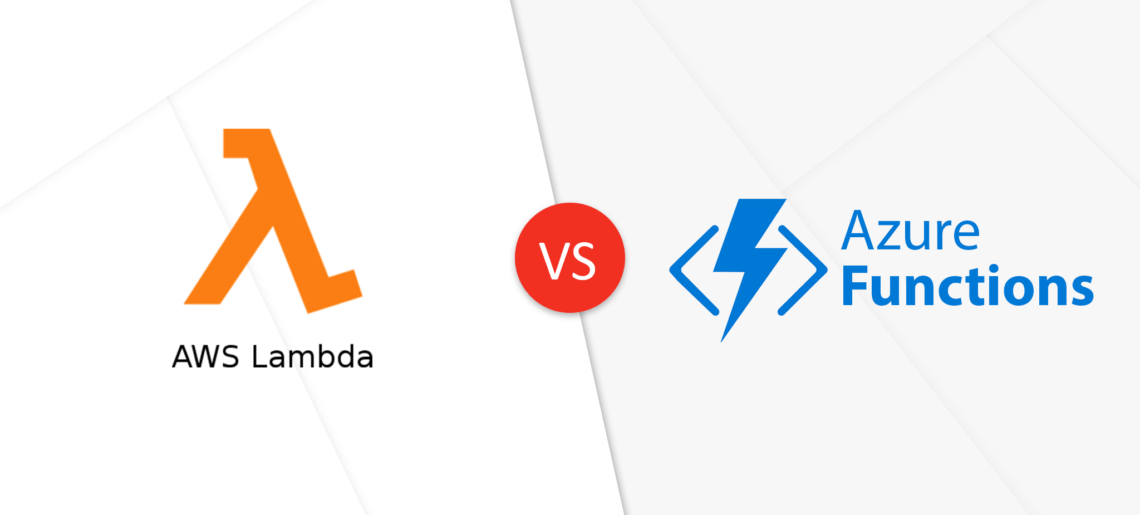AWS Lambda vs Azure Functions

Serverless compute has brought high availability and unlimited scale to every business in the world. This is the vision of Microsoft and Amazon who have become the biggest vendors of today. This is the time when businesses are forgetting about managing virtual machines or paying extra for their idle hardware because of serverless solutions. However, this is the time to compare two of the biggest serverless providers to get to know more about each of these. Here we have brought a detailed comparison of AWS Lambda and Azure Functions, which are meant to offer you ease and more benefits. So, here we go:
Contents
What is AWS Lambda?
AWS Lambda is one of the most amazing Function as a Service providers who will help you to run code without managing or provisioning server. You can consider AWS Lambda as an effective event-driven computing platform which will run when a function will be triggered by any event. It will execute the code that has been loaded in the functions.
This efficient and effective serverless computing service is being offered by Amazon Web Services. It will allow its users to develop functions and write self-contained applications in any of the supported languages. They will upload these functions on Lambda for their efficient, flexible and effective execution.
AWS Lambda Pricing
Services of AWS Lambda are based on a pay as you go. You will be charged on the basis of number of requests and duration for your functions as well as the time it is going to take to be executed. Lambda will count every request every time it will start to execute in response to any event or function call.
This will also include test invokes from console. While, the duration of function will be calculated from time your code starts execution to until it terminates or otherwise returns. The price will also depend on the memory allocation for your function. In the resource model of AWS Lambda, you are going to choose the memory amount required for your function. Similarly, CPU power and various other resources will also be allocated here.
However, the free tier use of AWS Lambda will include compute time per month of 400,000 GB-seconds and 1M free requests per month.
AWS Lambda Benefits
Here are key benefits of using AWS Lambda as your Function as a Services solutions. Knowing about these benefits will certainly give you some compelling reasons to use this service.
- The best benefit of AWS Lambda is affordability. As this solution is based on pay as you go model, so you will not be charged for anything extra as in other options.
- If your application goes viral suddenly and you are using AWS Lambda, then you don’t have to be worried about its scalability. Because it will prevent your application from being overloaded with its automatic scalability.
- The biggest benefit of AWS Lambda is that it supports an immense variety of use cases.
- It allows developers to ship their codes from vendors directly and helps them save much of their time easily.
- The lambda functions are meant to perform any type of tasks from processing data streams, calling APIs to serving web application and integration with other services of AWS.
What is “Azure Functions”?
Azure Functions is one of the most exciting serverless compute which helps users to execute events triggered code without having headache of infrastructure management and provisioning. Being a triggered based solution, Azure Functions runs a piece or script of code in response to an amazing variety of events. Azure functions can be used for effective decoupling, reusability, high throughput and shared in the best possible way.
More amazingly, as Azure Functions is one of the most reliable solutions, therefore, it can be used for productions environments too more effectively. However, Azure functions can be run for any of the triggered event, but it does not run on a continuous basis. This solution is supporting multiple languages such as F#, C#, Node.js, JavaScript, and more.
Azure Functions Pricing
Consumption bill of Azure Functions is based on resource consumption per-second. Most amazingly, the monthly bill of Azure Functions also includes a free resource of 400,000 GBs resource consumption and 1 million requests per subscription based on pay as you go offer. It offers a flexible yet affordable pricing plan for all the resources being consumed.
Azure Functions Benefits
Here we have some of the most amazing benefits of Azure Functions which you must know:
- Azure Functions offers automated yet flexible scaling on the basis of your application’s workload volume. It will let your business to keep its focus on providing value rather than spending time on infrastructure management.
- Azure Functions offers an integrated programming model which is based on bindings and triggers that are meant to respond to events and seamless connect to its other services.
- It offers great end to end development experience from developing and debugging to monitoring and deploying with built-in DevOps capabilities and integrated tools.
- It supports an amazing variety of hosting options and programming languages. Ultimately, users will be able to make a better pick on the basis of their scenarios and can adjust to meet the requirements of their businesses quickly.
- Azure functions can let you develop serverless applications within fraction of time which is otherwise required in traditional development processes.
Differences between AWS Lambda and Azure Functions
Here is a comparison between both services:
Programming Languages
- AWS Lambda – Java, Go, PowerShell, Node.js, C#, Python, and Ruby
- Azure Functions – C#, JavaScript, F#, Java, PowerShell, Python, Typescript
Scalability
AWS is playing this game longer than Microsoft. It may be a more desired service for huge workloads. For all other use cases, both players will work pretty well.Pricing Structure
Pricing Structure
Pricing structure for both services is very similar.
Hosting Options
- AWS Lambda – One single hosting option for all types of apps.
- Azure Function – Multiple hosting options (Consumption plan, Premium plan, and Dedicated) depending on your needs
Configuration
- AWS Lambda – You configure the memory size and this variable will be the main trigger to calculate the price. The pricing model is based on the number of executions, allocated memory, and execution time.
- Azure Functions – Multiple instance sizes available and price will depend on it.
Concurrency
Both services can run multiple concurrent executions
HTTP Integration
- AWS Lambda – API Gateway or ELB – Elastic Load Balancer
- Azure Functions – Ready to use HTTP endpoint
Conclusion
At the present time, approximately all the web-based business applications are based on cloud. However, if you are on the initial stage of selecting a function as a service solution for your organization, then there are higher chances that you would get to know about Azure functions and AWS lambda, the two of biggest vendors all around the world. However, making a selection between these two can be a bit difficult. But not anymore, it is because we have given you a detailed overview of both of the solutions. So that you can make a better selection on the basis of your preferences with ease.

What is AWS Lambda?
– It’s a serverless computing service delivery by Amazon Web Services.
– Price is a function of memory, requests, and duration
– $0.2/million requests and $0.0000166667 for every GB-second
– Benefits are scalability, cost effective solution, and use cases supported.
What is Azure Functions?
– It’s a serverless computing service delivery by Microsoft.
– Price is a function of hosting plan, execution time, and quantity of executions.
– Execution Time $0.000021/GB-s, $0.256 per million executions
– Benefits are flexible hosting plans, security, and scalability.
What are the differences between AWS Lambda and Azure Functions?
– Supported programming languages
– Hosting options
– Pricing structure
– Concurrency
– Configuration
– HTTP Integration



